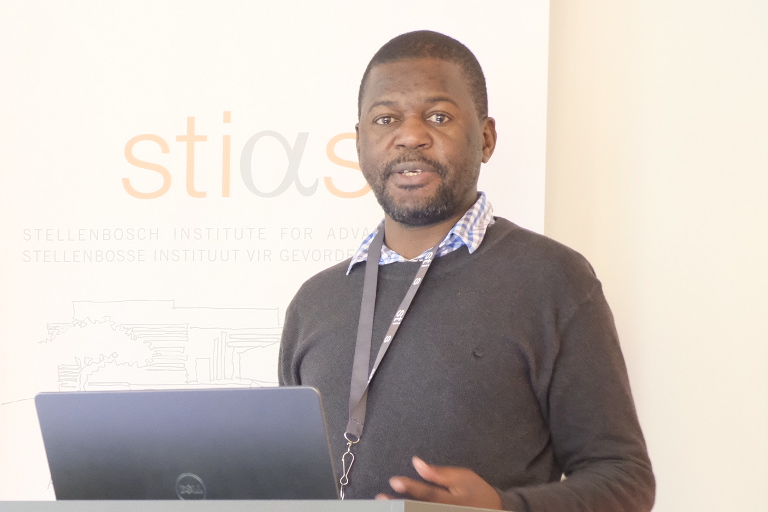“The neoliberal market-driven approach has yielded little in national and local economic development and led to decreased food production, unemployment and increasing starvation. The privatisation of the agriculture sector and it’s opening to market mechanisms has complicated the lives of the peasantry – especially women and children – making them subject to volatile markets and fluctuating prices.”
“Neoliberalism is the antithesis of democracy. The democratic path is questionable. We need to find alternative development paths, to rethink development politics and economics,” said STIAS Iso Lomso Visiting Scholar Freedom Mazwi of the Sam Moyo African Institute for Agrarian Studies, Zimbabwe. Mazwi was presenting a seminar on his latest book published this year by Springer.

Mazwi’s focus is on how globalisation impacts on peasant/small-scale or family farmers analysing especially how the peasantry have been impacted by neoliberalism since independence. He started from the perspective of Zimbabwe then expanded to include case studies from other southern and eastern African countries – South Africa, Uganda, Namibia, Malawi, Zambia, Kenya, Mozambique and Eswatini.
He pointed out that in the immediate post-independence years (from the 1960s) state-interventionist policies were implemented in most African nations. However, the policy-making space changed dramatically in the ensuing decades due to Structural Adjustment Programmes (SAPs) which effectively placed African states at the mercy of decisions made by International Monetary Fund and World Bank technocrats and forced agricultural restructuring.
“There was an overall 33% reduction in grain production in Africa post SAPs,” said Mazwi.
Significant impact
This shift had significant implications for agricultural policies and the peasantry in southern Africa. Prior to the rise of neoliberalism, family farmers received state support and protection from imports and I a whole other rage of areas such as agricultural finance, production and marketing. Neoliberal reconfigurations entailed the withdrawal of the state from financing agriculture through subsidies and state marketing boards, as well as large-scale privatisation. This involved scaling down public spending and privatisation of land tenure, as well as the promotion of land investments and contract farming in an attempt to attract international capital.
“The region’s agricultural sectors have become increasingly extroverted, driven by international capital. In some countries, this resulted in the introduction of tax holidays for international capital, promotion of joint ventures, and prioritisation of medium-to large-scale farmers in agrarian structures. Increasing integration into global capital circuits and markets has been problematic for family farmers, including marginalisation from agrarian economies and a decline in living standards and well-being.”
Contract farming geared for export of raw products predominates while the flow of capital into African agriculture via land grabs, contract farming and investments has been erroneously envisaged by African states. All resulting in policies that favour large-scale agriculture with the development of a trimodal structure in some countries due to the emergence of middle-scale capital farming alongside large-scale plantations and peasants.
“Economies were forced to open borders for free trade leading to industrial collapse, high unemployment and the international movement of capital. Opening borders allowed capital to flow but what was the outcome for Africa? Rising poverty, climate and ecological crisis, de-industrialisation leading to mass unemployment and the informalisation of the economy.”
Land reform
Patterns of land grabs and displacements further increased after the 2008 economic crisis (and are likely to increase further post-COVID) with calls for land reform intensifying in some countries. Mazwi pointed out that the response from governments to these demands has varied from state violence in Malawi and South Africa to the use of state apparatus to silence the dispossessed in Mozambique and Uganda which further raises issues of social justice, equity and democracy. “Nations that go beyond this and initiate expropriation without compensation become subject to punitive measures,” he added. “Zimbabwe has been isolated for two decades.”
“Land is key in Africa,” he continued, “central in the liberation struggles. Land reform is essential for survival in Africa. Africa is not heavily industrialised like Europe and the USA so what we do with the land is important.”
“Land reform is viewed as a precondition of development,” he continued. “But the situation is complex – farmers face the danger of eviction because of the state’s need for direct investment while at the same time much of the land remains underutilised.”
In discussion, he addressed the need to learn from other countries saying: “What has been done to US farmers should be a warning to Africa” as well as stressing the important role of co-ops. “There is a need for co-ops. Small-scale farmers have no collective voice and the state is not protecting them. We need to look at successful co-ops. They can give farmers autonomy, bargaining power, a voice.”
His STIAS project looks at the role of China in African agriculture. “China has been in the picture for a number of decades. But it doesn’t matter if the capital is from the East or West – capital remains capital, the motive is maximising profits.”
“Land concentration and alienation of small-scale farmers has led to a rise in hunger and food insecurity, unemployment, social polarisation, new divisions of labour, production for export, undemocratic practices and a lack of autonomy of African governments. It requires a serious rethink. We need to promote democracy in Africa and address the shortcomings of the neoliberal project which has essentially been undemocratic.”
“The life of the peasant farmer is not something to be romanticised,” he concluded. “However, the only way Africa can industrialise is through agriculture. We need new measures to ensure subsistence farming in Africa survives and to transform the lives of peasant farmers.”
Michelle Galloway: Part-time media officer at STIAS
Photograph: Noloyiso Mtembu
